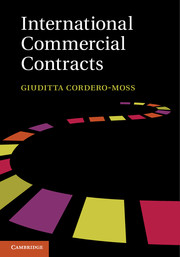Book contents
- Frontmatter
- Contents
- Preface
- Introduction
- 1 Contract practice and its expectations in terms of the governing law
- 2 The role of transnational law
- 3 The impact of the governing law
- 4 Which state law governs an international contract?
- 5 Does arbitration ensure a self-sufficient contract?
- 6 Conclusion
- Bibliography
- Index
- References
2 - The role of transnational law
Published online by Cambridge University Press: 05 June 2014
- Frontmatter
- Contents
- Preface
- Introduction
- 1 Contract practice and its expectations in terms of the governing law
- 2 The role of transnational law
- 3 The impact of the governing law
- 4 Which state law governs an international contract?
- 5 Does arbitration ensure a self-sufficient contract?
- 6 Conclusion
- Bibliography
- Index
- References
Summary
Introduction
That international contracts are drafted without taking into consideration the requirements and assumptions of any particular contract law seems hard to reconcile with the necessity of interpreting and applying international contracts in accordance with a particular governing law. Taking contract practice as a starting point, the observer could be tempted to question how an international contract shall be subject to a law that was not considered during the drafting. Scholarly writings have been proposing a uniform international commercial law as a desirable alternative to the traditional system that sees international contracts subject to a national law chosen by the parties or selected on the basis of conflict rules.
This literature presents various arguments aimed at showing that national laws are not adequate sources for governing international contracts. Arguments range from the rather pragmatic (and irrefutable) observation that it is costly and time consuming to analyse, for every contract, all potentially applicable laws, to the not necessarily always appropriate statement that conflict rules are a confusing and complicated mechanism and thus should be avoided, or to the usually unsubstantiated statement that national laws’ content is adequate to regulate domestic but not international contracts. This latter argument seems to be less frequently invoked following the publication of principles and rules made specifically for international contracts (such as the UNIDROIT Principles of International Commercial Contracts (UPICC) or the Principles of European Contract Law (PECL) described in Section 4.2). As these rules and principles – tailored to international contracts – show no structural differences from those of national laws, it is difficult to affirm that national laws are not adequate for governing international contracts.
- Type
- Chapter
- Information
- International Commercial ContractsApplicable Sources and Enforceability, pp. 27 - 79Publisher: Cambridge University PressPrint publication year: 2014



